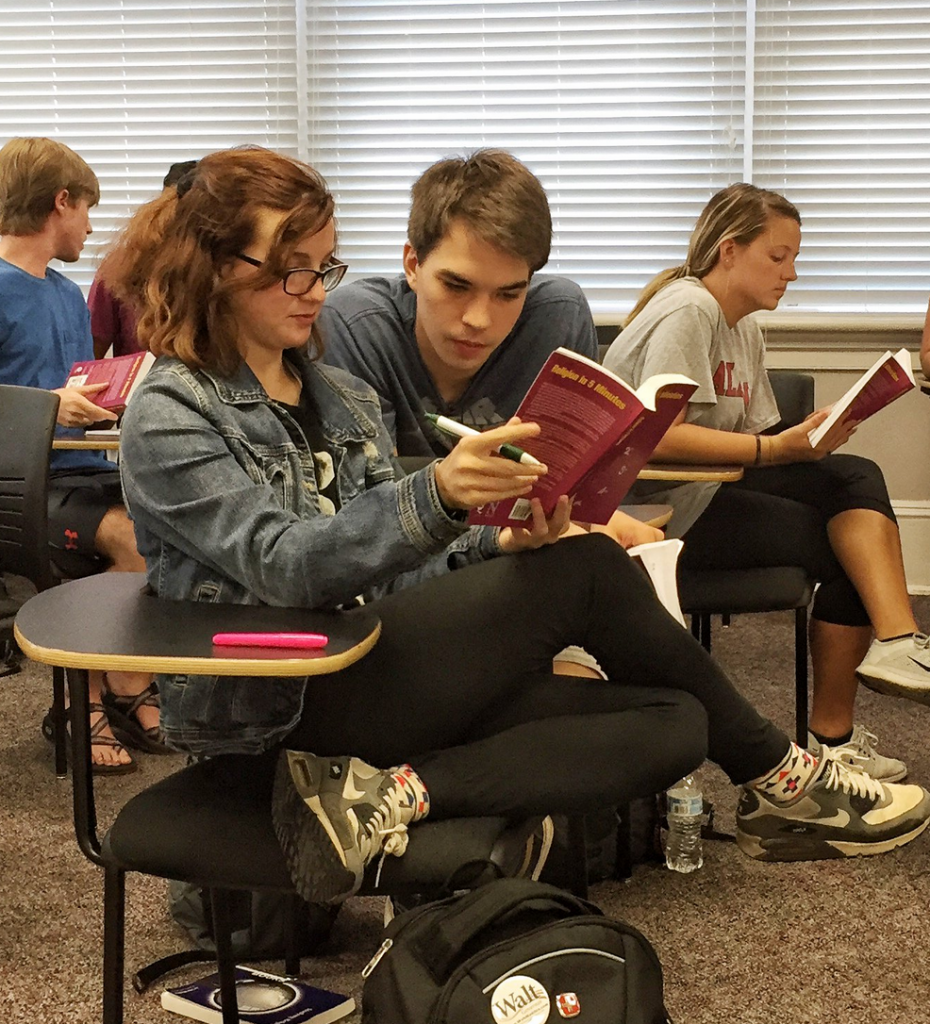
Jacob Barrett is a first year M.A. student in the Department of Religious Studies at the University of Alabama. From Colorado Springs, he earned his B.A. from Nebraska Wesleyan University in Philosophy & Religion and Biology. In the Spring he will present his research at the southeast regional meeting of the American Academy of Religion.
Junior year of my undergraduate degree, I was asked by the chair of the Religious Studies department to represent the major at an event where first year students would more-or-less speed date with different departments to start deciding what they wanted to major in. I was paired with the new Religion professor and together we set out to convince first year students to begin thinking about why participating in our department (whether that be majoring, minoring, or just taking several classes) was advantageous to them. I started with the typical “The faculty are so supportive and amazing” and “The major is pretty flexible so if you are a double major it is really easy to fit in” and “The classes are really fun and they also cover a lot of the requirements in the curriculum, so you can kill two birds with one stone by taking a course.” When the professor started his part, he said something so simple yet so important: “We teach you how to think, how to write, how to talk about things in ways that other departments don’t.”
With universities proposing cuts to Religious Studies departments becoming more and more of a regular occurrence, there is the feeling that we (those who consider ourselves members of “the field”) must defend the importance and relevance of what we do and what we offer. Religious Studies departments are often not producing majors or bringing in money in the same numbers as larger departments, so they become an easy target when universities need to find ways to save money. How, then, do we convince a university to keep our departments?
“We teach you how to think, how to write, how to talk about things in ways that other departments don’t.”
While other disciplines can (and do) offer opportunities for critical thinking, Religious Studies is unique in that our object of study “religion” is something that students of many different majors would say is socially and personally relevant, and even important. Explicitly teaching students to ask questions and think differently about often unspoken and invisible contingencies is a foundational literacy that Religious Studies provides. Whether a course discusses the complexities of a religious freedom court case or the intersection of race and religion within apocalypses or the role women play in different religious groups, Religious Studies invites students to challenge the often-unnoticed impacts that religion has on the world around us. If a student can grapple with how their preconceived and preconditioned ideas about religion work to create what they experience as reality in the safety of a Religious Studies classroom, then thinking critically about other areas of society becomes easier and they can recognize the importance of doing that work.
We teach students to implicate themselves in their biases and be self-reflexive about the role they play in replicating systems as natural. We teach students to be intentional and direct in crafting their arguments and to write with precision because we examine how our terms are impactful and political. And we teach our students how to ask questions about something that goes unquestioned and recognize the contingencies where others do not. Studying religion creates the space for analysis and critical thought where other disciplines do not because it assumes so many cliches, is so taken-for-granted, and is so steeped in cultural assumptions. If students can be rigorous thinkers about themselves and religion, then they can be rigorous thinkers about anything!
No matter if our students head off to law school or medical school or into the business world, they have gained the skills to think, write, and talk about an often-uncomfortable topic. Sure, a doctor who has some baseline knowledge of a religion they might encounter in their patients is important. But the true importance and relevance of our field is found in the critical thinking skills we are equipping our students with, skills that can be deployed in whatever field they move into after they leave our classrooms.
Photo from Prof. Emily Crews’s REL 105 Honors Intro to the Study of Religion class (Fall 2018).
Not happy with having to justify why Religion exists; not at all happy with defining Religion via negativa; as a discipline teaching what others don’t. We have gotta come up with a better way to describe it in an autonomous way.